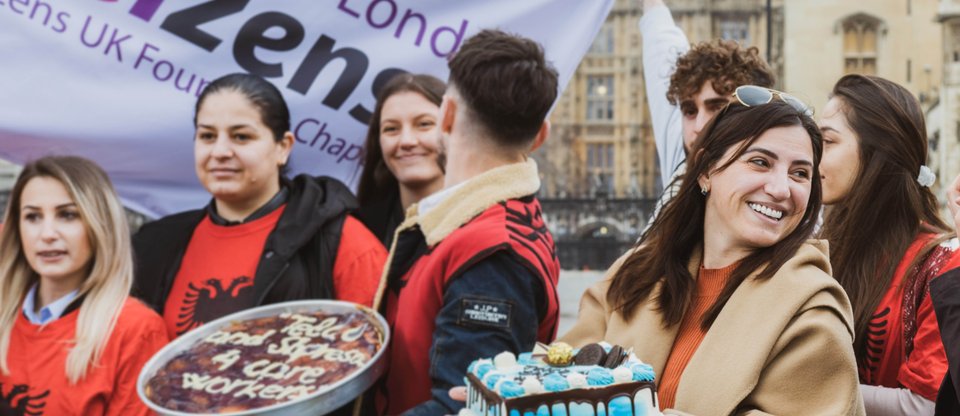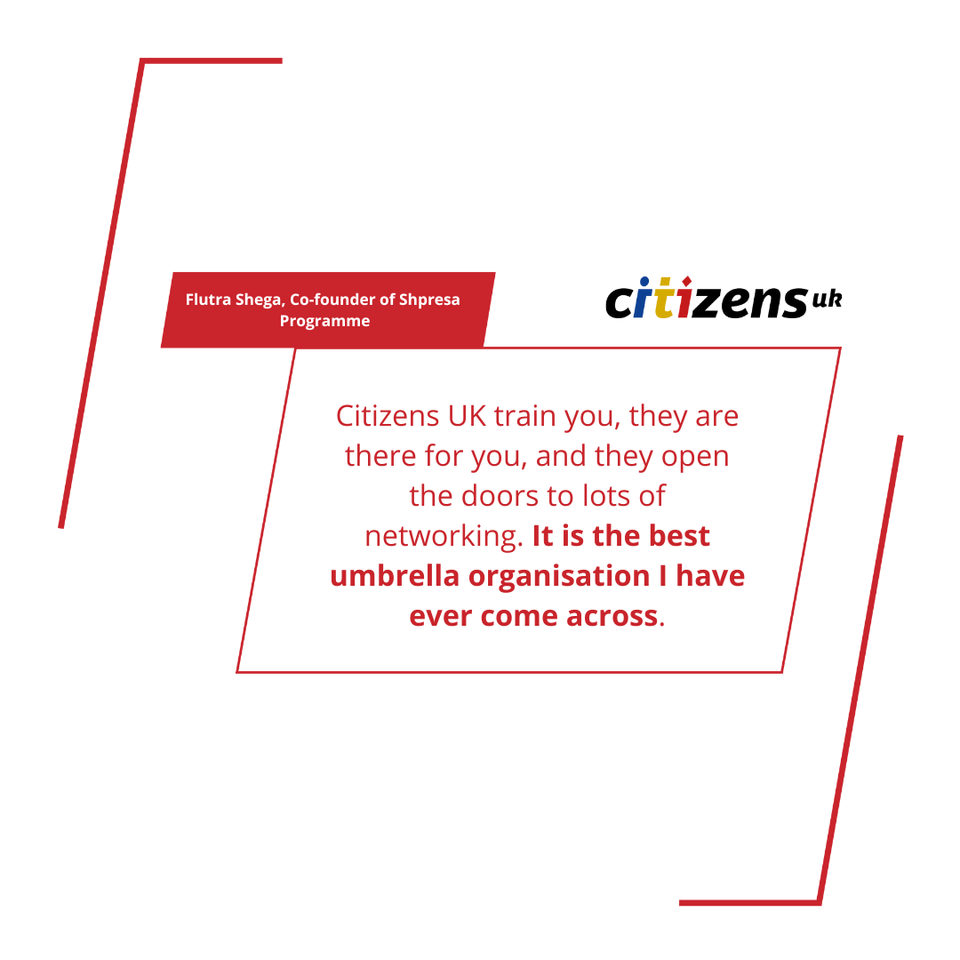Join us as a charity
WHY DO CHARITIES JOIN?
Charities choose to become members of Citizens UK to build a better, fairer society.
We overcome injustice by working together driving community-led solutions to big and small problems, that work for everyone.
Community Organising allows charities to build positive working relationships between communities, organisations, elected power-holders and business, making sure everyone is heard and no one is left out.
By joining as a member you will not only demonstrate a wider commitment to social justice but also have further opportunities to connect with other members, building greater support for your charities' chosen cause.
Together, we have a proven track record of charities developing leaders, building relationships, and winning change on the things that members and the wider community care about most.
WE HELP CHARITIES DEVELOP THEIR LEADERS
Case study: Shpresa

The Shpresa Programme (Shpresa) supports Albanian-speaking refugees and migrants in the UK to play a positive and active role in British society.
In 2004, Shpresa’s membership journey began with Citizens UK after a positive experience members of their board had at a Citizens Assembly. Seeing the power of broad-based organising in practice – where a diverse group of organisations organise together - and the opportunity to vote on agendas led CEO Luljeta Nuzi to see how community organising could help Shpresa’s vision.
It has been eye opening and a great learning opportunity for our team and members. Shpresa is built on two sets of models. It’s a combination of the School for Social Entrepreneurs philosophy, and the empowerment, campaigning and organising aspect of Citizens UK. The learning from these two institutions have carved me as a leader, and I think Shpresa has found the right model to bring about the positive change we want to see.
Luljeta Nuzi, Shpresa CEO
Since joining, Shpresa has massively grown in scale, developing thousands of leaders, and continuing to achieve their goal of uplifting the voices of those who at times have felt excluded from British society. Citizens UK community organisers continue to support this goal by becoming mentors to members of the Albanian community, not only encouraging them to raise their voice, but also by supporting their campaigning journeys.
Together with our members, we go on to change people’s lives and attitudes, or the environment around them, so they have the ability to bring that change. With Citizens we have seen migrant issues become forefront, and sometimes other campaigns are on the agenda. I think the Albanian community has built its presence and voice via partnership work and by being an active member of Citizens UK. Our campaigns so far have shown that when done well, organising leads to the change we want to see. We have always used that as a tool to train people and to have a culture shift, believing in a power-based approach through listening
Luljeta Nuzi, Shpresa CEO
This allyship has seen Shpresa having gone onto 20+ years of organising success and securing many wins, including the Albanian language becoming a registered GSCE language, ending child detention laws, enabling the opening of bank accounts by asylum seekers, and removing financial barriers for families to apply for their children’s British Citizenship.

WE SUPPORT CHARITIES BUILD RELATIONSHIPS
Case study: English for Action
English for Action (EFA London) are a long-term member of Citizens UK, becoming members 10 years ago. EFA London are committed to supporting migrants to learn English and taking action for social justice.
As part of their #LoveESOL Campaign, they set up ESOL courses with community partners to ensure classes are accessible to people who may otherwise miss out. EFA also has the larger goal of making London a more equal city, whereby everyone can thrive irrespective of where they are from.
Whilst ESOL was not making it onto the agendas of election assemblies, negotiations with councils or the Greater London Authority (GLA), EFA London was able to learn through other London Citizens members that the lack of ESOL classes is a shared, larger issue. This allowed for the ability to collectivise and demonstrate support towards ESOL campaigning, which further highlights how relationships built with other member organisations can lead to bigger opportunities and further support.
We recognised that through our membership of London Citizens and alongside ally organisations we were much more powerful and potentially had a seat at the table with local authorities and GLA politicians
Dermot Byers, Co-Founder of English for Action
In 2017, these steps in building relationships transformed into physical support as a mass teach-out action was organised outside London City Hall, who are responsible for developing ESOL policy. It was a successful event, with over 90 ESOL students attending and EFA London being invited to a meeting with those London City Hall workers responsible for ESOL policy to discuss how they could work together on this issue.
Five years on, and after building power through many more meetings and actions, EFA London’s hard work saw results. At the 2021 London Citizens Mayoral Assembly, the Mayor of London announced his support for ESOL and committed to providing an ESOL website for London to improve accessibility.
During this time, Citizens UK provided further support towards developing the right asks which resulted in EFA London winning important commitments from council leaders across London. Examples of these carried out commitments include City Hall appointing an ESOL Coordinator role and raising the threshold for fully funded classes to anyone earning less than the London Living Wage, making free classes accessible to a further 20,000 people.
Over this time, we have built hundreds of relationships, supported with actions and campaigns not directly in our self-interest and received support in exchange on the campaigns most important to us...gradually, ESOL has become a bigger and bigger priority for Citizen's alliances across London and the country
Dermot Byers, Co-Founder of English for Action
WE HELP CHARITIES WIN
Case study: Reach Hub (Feltham)
The Reach Hub is part of the Reach Foundation. Their mission is to support all children to live lives of choice and opportunity, acting locally (in Feltham) and across the UK, through a community based ‘cradle-to-career’ model, grounded in great schools, to pursue systemic change.
The Hub began their Community Organising journey by reflecting on their mission and the degree they were ‘doing to’ other people, rather than ‘building with’ them. They then decided to invest in organising, joining Citizens and trained their first team of staff in 2018. This Reach team strengthened their internal relationships through creating a regular habit of relational meetings, where they reflected on how they were implementing their mission. The staff team then started to use relational meetings with parent and student leaders.
In 2020, during the pandemic, they ran a listening campaign with a team of parent leaders, listening to over 100 parents, finding that many felt unsafe at Feltham station because of a local, badly lit alleyway with broken fencing. Although this seemed far away from their stated mission, what they found was that confident, involved parents, had a meaningful impact on the school attainment of their children. So, they supported a team of Reach parents to build a campaign.
And the parents won!
This laid the foundation for rapidly expanding set program of organising. First, the Reach Hub became a founding member of Hounslow Citizens, an alliance of 6 faith, charity and education organisations working for justice and the common good. They then sent 95% of their staff on 1 day or Citizens UK’s 3 day training. Reach are now intentionally developing a range of parent and student leaders, spotting the most talented and supporting them to participate in a ‘leadership development tracker’ over a 12 month period to trace how their organising skills and confidence grows. The Reach Hub is now working with a varied network of over 200 parents and students from across Feltham through a variety of projects, all of which have community organising embedded within them: the Feltham Convening Project, a collective-impact initiative to improve outcomes for children and young people in Feltham; a listening campaign hearing the stories of early year professionals across Feltham’s nurseries; and a student-driven campaign to build a ‘Youth Zone’ – a massive youth centre with over 100 activities and 40 permanent youth workers.
On a personal and institutional level, community organising has become both the compass and the map that we try to follow. The core principle of 'putting people before programmes' sets the direction: it acts as an internal compass, ensuring that we do not get distracted and wander down paths of our own making, instead being guided by listening and staying focused on what really matters to people and the community. And then once this direction is clear and has been set, organising provides us with a method for moving forward: an action cycle and a discipline that we can work through, practise and learn from every step of the way. It makes our work more joyful, our relationships stronger and our impact greater
Mei Lim, Director of the Reach Hub




